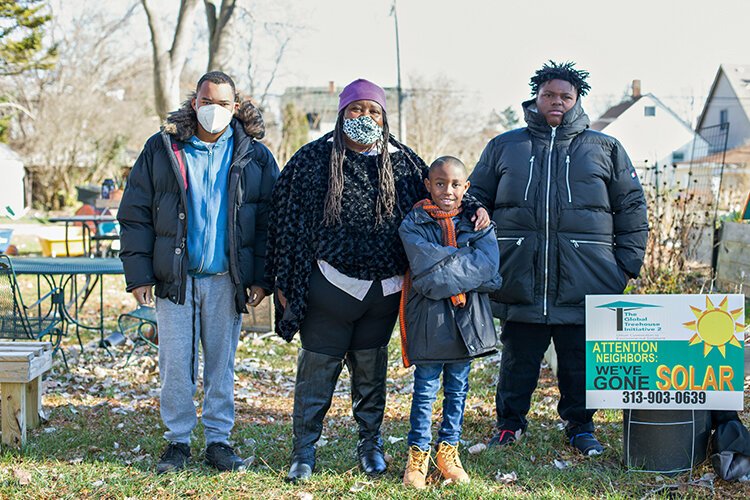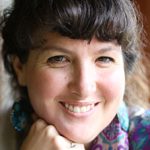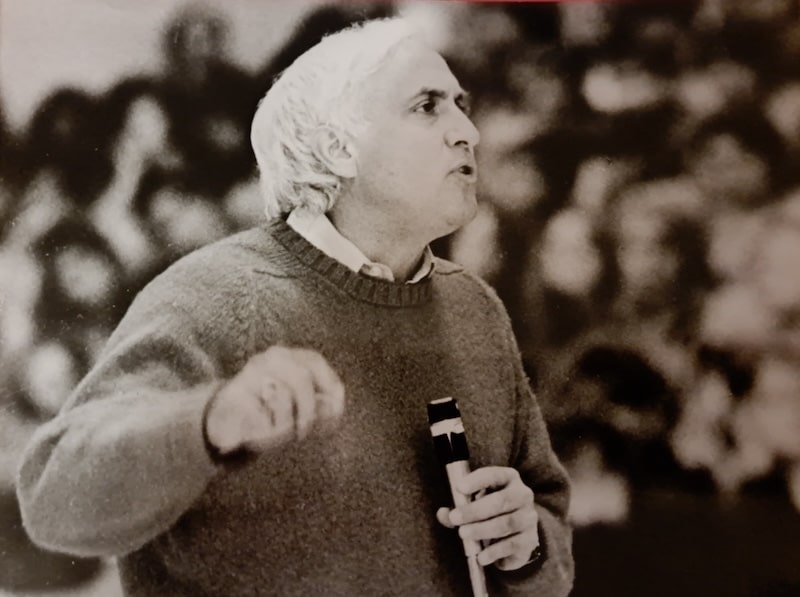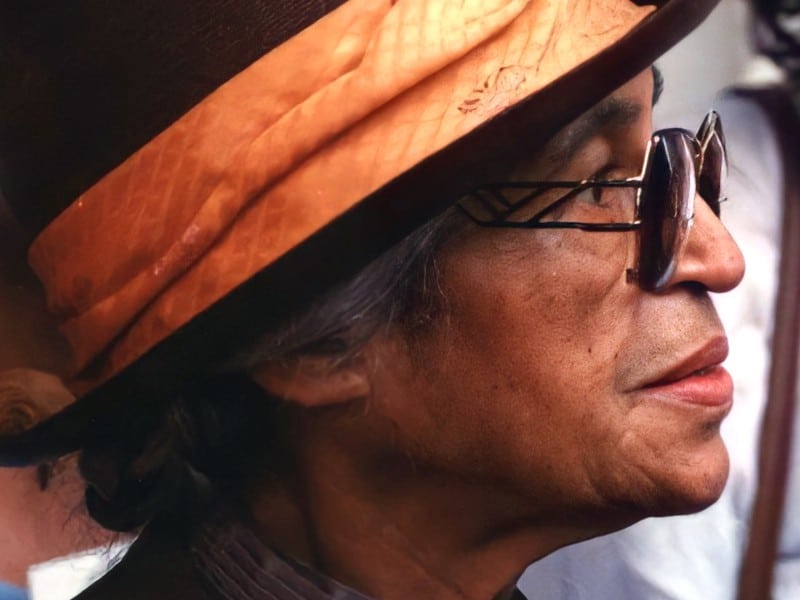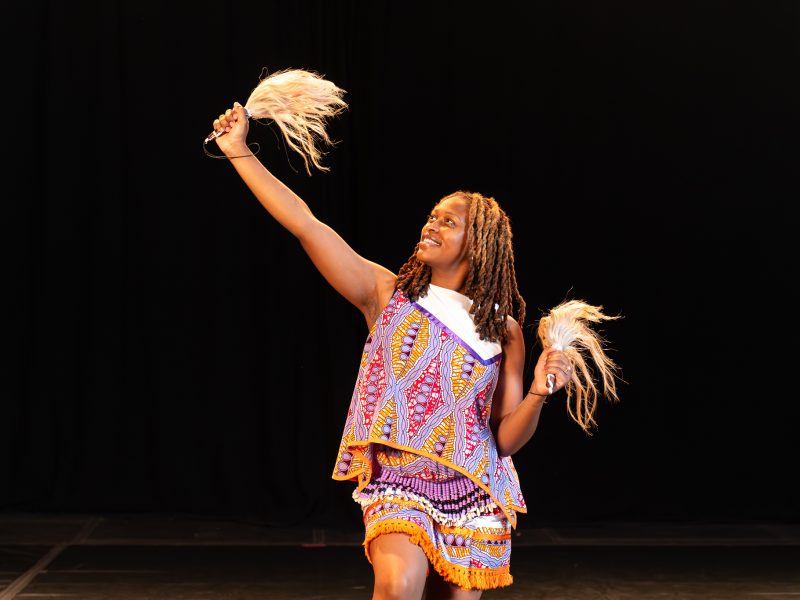‘People to support, not problems to be solved’: How this Detroit fellowship cultivates change-makers
When COVID-19 hit Michigan this year, the Detroit Innovation Fellowship cohort were well placed to support the communities hit hardest. The 23 social innovators involved in the talent development program are proving that their focus on creating sustainable, accessible resources builds the kind of resilience that see communities through a crisis.
This special report is part of a series supported by the New Economy Initiative (NEI), a special project of the Community Foundation for Southeast Michigan that is working to build an inclusive regional network of support for entrepreneurs and small businesses. Social entrepreneurs featured in this series are fellows of the last cohort of NEI’s Detroit Innovation Fellowship (DIF), a talent development program that connects, promotes, and invests in people who are leading projects to transform their communities.
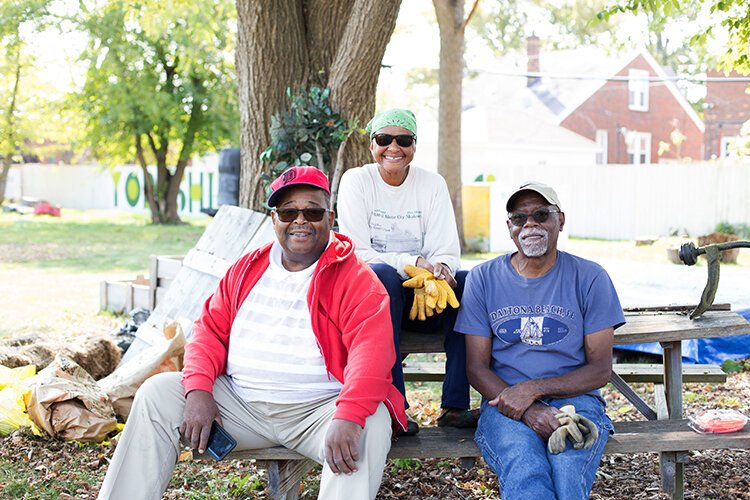
Working in some of Detroit’s most affected neighborhoods, the 23 change-makers that make up the Detroit Innovation Fellowship (DIF) witnessed the impact of the coronavirus pandemic firsthand, many of them losing loved ones and project partners to the virus. Their focus on building up their communities through accessibility and land-based projects, however, helped many of them sustain their projects through COVID-19.
This was certainly the case for Mose Primus. When the pandemic hit, he teamed up with fellow cohort member Tammy Black, to give away produce boxes to residents in need. In Warrendale, fellows Barb and Joe Matney set up a food distribution program at their community garden on Minock Street and Whitlock Avenue and in Southwest Detroit Juan Carlos Dueweke-Perez fundraised for local restaurants forced to close during the pandemic.
Some of the group were working together already, but most met through the DIF program, a talent development initiative that identifies and invests in social entrepreneurs who are transforming communities in the cities of Detroit, Hamtramck, and Highland Park. The New Economy Initiative (NEI) program, a special project of the Community Foundation for Southeast Michigan, is now wrapping up its second year and second cohort, with each awardee receiving $10,000 of grant funding along with professional development training from the Urban Consulate.
The 2019-20 cohort includes solar power engineers, community garden organizers, performing arts directors, green architects, and health equity leaders, all working in their own communities to improve residents’ lives. With quarterly meetings to encourage collaboration, the fellows unanimously report the benefits of leaning on each other, especially during COVID-19.
“A lot of our DIF are positioned in such a way that they’re programming outdoor space,” says Matt Lewis, director of governance and operations at Community Foundation for Southeast Michigan. “They were positioned to serve their communities better than anybody, they were a safe place.”
Carrie Morris‘ performing arts group’s focus on accessibility is what protected them, she says, while others in the performance industry faced heavy COVID-19 setbacks.
“Ticket sales weren’t really driving our revenue,” says Morris, who pivoted her team to stage video productions in collaboration with the Detroit Zoo this year.
NEI was able to secure an additional $2,500 in funding for the fellows’ 18 projects this year, as they, in turn, supported their own communities through the crisis. For Tanya Saldivar-Ali and her husband, Luis, networking platforms the program introduced them to enabled access to an additional $8,000 in grant support during COVID-19. It’s tangible proof, Saldivar-Ali says, that connections have value.
“Relationships are the future currency,” she says. “And will be crucial moving forward in these unprecedented times.”
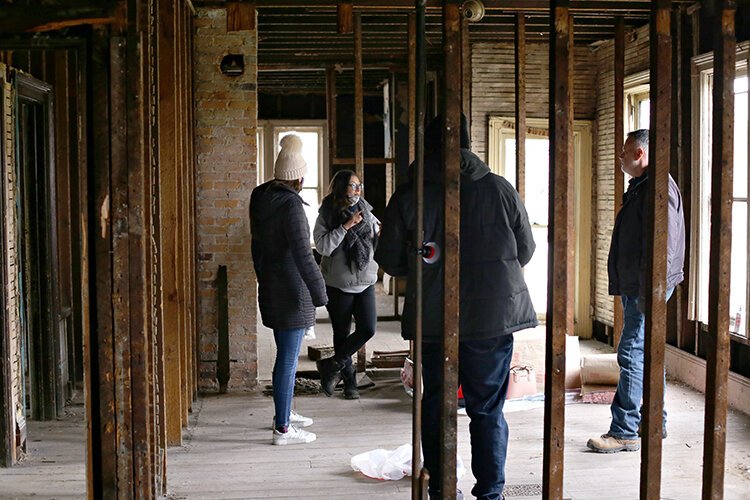
Sparking connections
The impact of connecting social innovators across Detroit is perhaps best demonstrated in the growing buzz around solar power. In neighborhoods where electricity and internet connection are not always guaranteed, having a reliable community power station means consistent WiFi and energy sources. It’s a problem many of the cohort’s communities face, especially this year with the global pandemic requiring online learning for students.
Soulardarity founder Jackson Koeppel, who is responsible for many of the solar-powered street lights springing up in Highland Park, was recognized in the first DIF cohort and has inspired many of the other fellows who plan to light up their community spaces. Koeppel was already partnering with engineering company Ryter Cooperative Industries (RCI), part of the DIF second cohort, to offer a bulk purchasing program called Power Up to make solar technology more affordable, but the DIF program amplified their efforts.
For Morris, part of the current DIF cohort, connecting with Koeppel and RCI co-founders Ali Dirul and Karanja Famodou helped her understand how solar energy could be an affordable, easily installed component of her performing arts space on Carpenter Avenue.
“Karanja Famodou met with me and came up with a proposal for ways we could employ solar energy across our amphitheater and public green space site,” says Morris. “[We] applied to the Michigan Council for Arts and Cultural Affairs for funding, and a few weeks ago we were awarded funds that we will use to hire Ryter for the install of these solar components in the spring of 2021.”
It’s these collaborations that the DIF program hopes to foster.
“One of the cool things about the fellowship is the time they get to talk together, there are organic partnerships that grow,” says Orlando Bailey from Urban Consulate. “It’s amazing.”
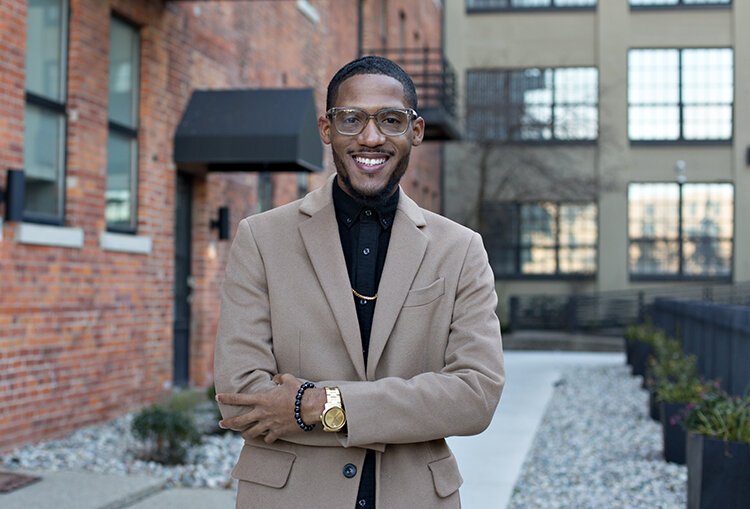
Claiming spaces
Detroit has more than 24 square miles of structure-free land (not including parks) and Wayne County, where the DIF cohort predominantly resides, accounts for 61.7% of tax foreclosures statewide, so it’s no surprise that blight is one of the main issues the fellows tackle in their neighborhoods.
“Since the economic decline in 2008 we saw massive population loss, school closing, business losses,” says Bailey. “We were left with large swaths of abandoned land. When we talk about Detroit we can talk about housing and economic strategy, but we also have to have a conversation about our land. We are a big city and planning needs to not forsake that. It’s an asset, not a liability.”
The DIF cohort is proving the point. In Yorkshire Woods, Primus has mobilized his neighborhood, and funding, to demolish three derelict homes on six lots of land, transforming the spaces into community gardens, beehive housing, and gathering spaces. He isn’t stopping there either, with a vision to convert a defunct school building into a senior living development with sports grounds and community facilities.
Over in Highland Park, Juan Shannon is using green technology to power urban farms and has plans for a solar-powered cafe, and all along Manistique Street in Jefferson Chalmers visitors can see the influence of Black, who organizes community garden spaces. Black, with the Manistique Block Club, is developing the construction of a 400-foot treehouse community center, designed to be completely solar-powered and ADA-compliant, that will host occupational therapy, counseling, and educational resources.
On 18th Street Saldivar-Ali’s AGI Construction company is renovating a Queen Anne-style residential house to create a green design hub, with the goal of connecting residents to career pathways and mentors in the construction industry. They are incorporating residents’ stories into interactive displays at the hub, and are using virtual reality and 3D tours to bring their vision to life.
“We have seen a ton of creative prowess with reclaiming,” says Bailey. “This cohort has taken that ball and run with it and we are excited to see what happens.”
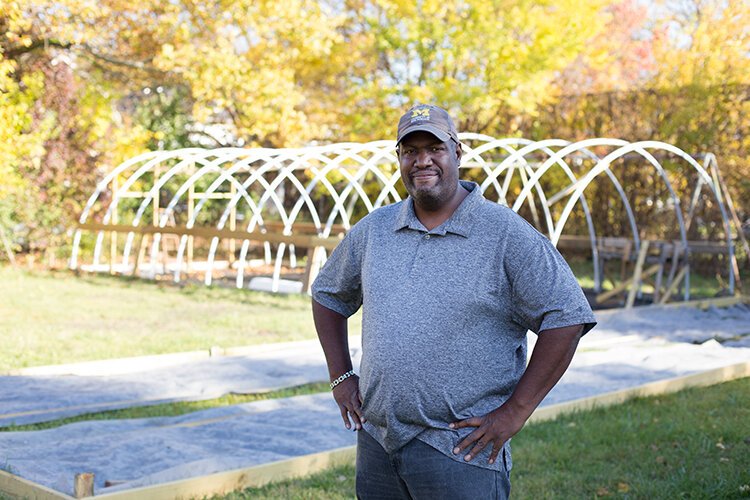
A bumpy beginning
After a series of successful projects focused on small businesses, NEI started developing an expansive initiative to identify challenges and opportunities within neighborhoods, aiming to go beyond traditional roundtable discussions to create a team to identify social problems and solutions.
NEI Associate Director Don Jones and NEI Executive Director Pamela Lewis took the idea to Jeanette Lee and Diana Nucera at Allied Media Projects, for sounding board feedback, and were met with a few hard truths.
“They listened politely,” says Jones. “And then said ‘interesting, but you know people in the neighborhoods already know what their challenges are, there are already people doing the work’.”
So, NEI went back to the drawing board. Jones sat down with Matt Lewis and consultant Tom Sherry from 313creative to come up with the current DIF program.
“We didn’t want it to be overly complex,” says Jones. “We wanted to get out of people’s way.”
The initiative does just that. Stripped of lengthy application processes, extensive summary reports, and strictly-monitored budgets that often create barriers for innovative projects seeking funding, the program purposely gives the fellows as much autonomy as possible.
“People knew what they needed,” says Matt Lewis. “It was about identifying people to support, not problems to be solved.”
It’s a unique approach to philanthropy, but one NEI sees working and becoming more popular in the sector. One of the major barriers to funding social innovation is an over-emphasis on causality and attribution, according to research from the Center for Effective Philanthropy. The report claims that as foundation leaders seek to demonstrate accountability, they can create “unintended negative consequences,” something NEI has been conscious of in the creation of the DIF program.
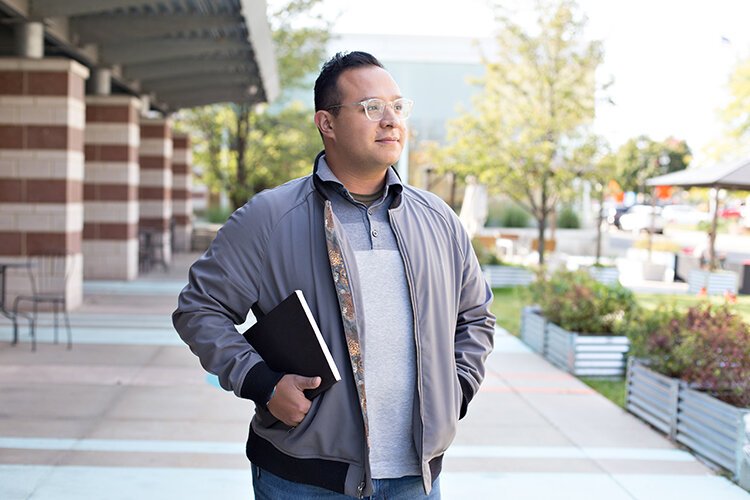
Supporting ‘bottom-up’ philanthropy
After the initial setbacks, the NEI team set about listening. They used council districts as a rough framework, engaged with Issue Media Group’s publication Model D, and spent a year focused on connecting with residents in Detroit, Hamtramck, and Highland Park.
“We were really there to listen,” says Matt Lewis. “To hear their projects, host listening sessions, and hear the stories that emerged from those sessions.”
Through the community listening session, NEI identified a group that represented the diverse interest within communities and invited them to form the first DIF cohort. The 2018-19 group included innovators like Avalon Village CEO Shamayim “Mama Shu” Harris, who has spent the last decade transforming spaces in Highland Park, and Nicole Lindsey and Timothy Paule, the co-founders of Detroit Hives.
“What we sought to do was to acknowledge people in an unconventional way,” says Bailey. “We wanted to do something that granted funds to individuals and not organizations, being intentionally loose on how the grantees could spend the funds.”
Funds have gone into the projects fellows work on, but the flexibility of the fellowship allows the innovators to put the money where it matters most. Fellows were able to purchase items like washers and dryers to better provide them the time to continue their work. Beverly Frederick, who works to beautify Rosedale Park, called Jones around a month into the DIF program to ask permission to donate a couple of hundred dollars to her neighbor, a retired postal worker who was struggling.
“We just scratched the surface here,” says Jones. “This is an important lift, and it doesn’t have to be that hard.”
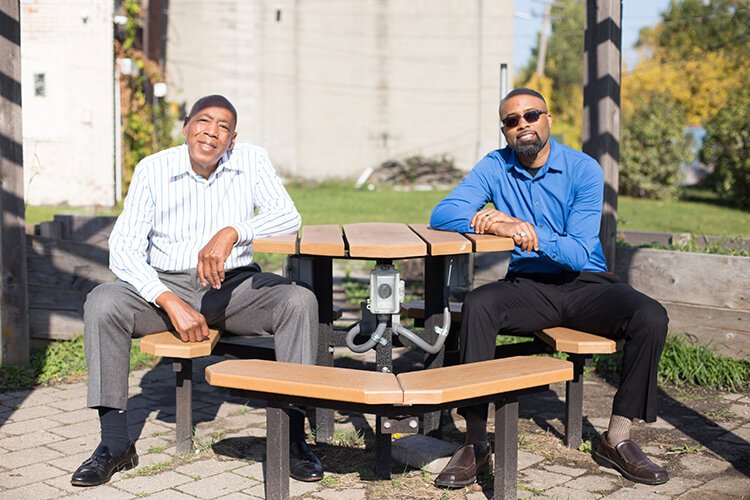
Building trust
It would be a misconception that this style of funding takes an incredible amount of trust in the recipients — Jones is quick to point out it’s the other way around, NEI had to gain the fellows’ trust. It took time for fellows to trust that the support was real, and that the networking and training were genuinely valuable for their projects.
“What is dope about innovation fellows is that the fellows look like Detroit,” says Bailey. “Previously Detroit’s resurgence was always coupled with white millennial faces, the DIF looks like the city and reshapes and reframes a narrative that was deficit-based, that assumed the folks who live here weren’t doing anything. They need to be celebrated for the vitality that a lot of the neighborhoods still have, they are picking up when the city couldn’t.”
For many of the DIF group, being selected means an acknowledgment of the impact they have in their community, and that they are on the right track to make a difference.
“The fact that the innovation fellows are nominated, that this is not a program someone can apply to, was really a big honor for me,” says Morris. “It was a sign that the work I am doing in my neighborhood is seen as an important asset.”
“Being named a DIF felt like validation,” says Shannon. “Being a fellow is a huge recognition of the work that I and my team do for the love of our community every day.”
Firefighter and health equity leader Gary Ringer agrees, adding that the funding helped identify social innovation as more than volunteer work — something he hopes receives wider recognition in the future.
“To be recognized and compensated for the work you have been doing for free, is extremely gratifying,” he said.
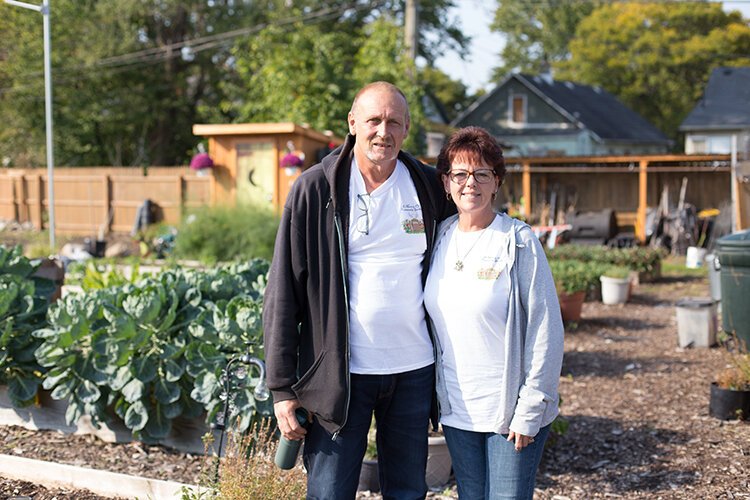
.
Increasing exposure
Part of NEI’s goals was to give credit where credit was due, to innovators already making a difference that is, while incredibly powerful, slow-burning. Elevating their work is a core goal.
“Fellowship is a rarefied thing,” says Matt Lewis. “You hear about grants that are very opaque, a lot are about people with very impressive credentials and pedigrees on paper, but for our group we wanted to create a bit of mystique for these folks that was deserved. It opened some doors for them.”
For the Matneys, networking through the DIF program led to a connection with the Detroit Residents First Fund, dramatically increasing their impact in Warrendale.
“We were able to double the size of the Minock-Whitlock Park,” says Barb Matney.
The DIF program also connected Dueweke-Perez with social innovation projects happening in New Orleans, where he hopes to collaborate with similar change-makers at Propeller.
“I’ve learned that many of the issues that exist in NOLA are similar to those here in Detroit,” he says. “I hope to learn how challenges are tackled down south so I can continue building partnerships that lead to solutions here.”
Showcasing the fellows’ work at Michigan House panel discussions at South by Southwest (SXSW) was another way NEI highlighted projects, but it also provided fellows with confidence in their work. After Frederick presented her project in northwest Detroit at SXSW early in 2019, she told Jones the enthusiastic response from the audience helped her realize her work is much bigger than her own neighborhood block, and that she “really is an expert” in community leadership.
For Bailey, the DIF program stands as a model for other organizations, one that could be implemented in other parts of the nation and funding sectors.
“I think that people can learn, in the funding community, how to support folks who are already doing good work,” he says. “We often give money and expect something new with this funding, but there’s people who just need the support.”
